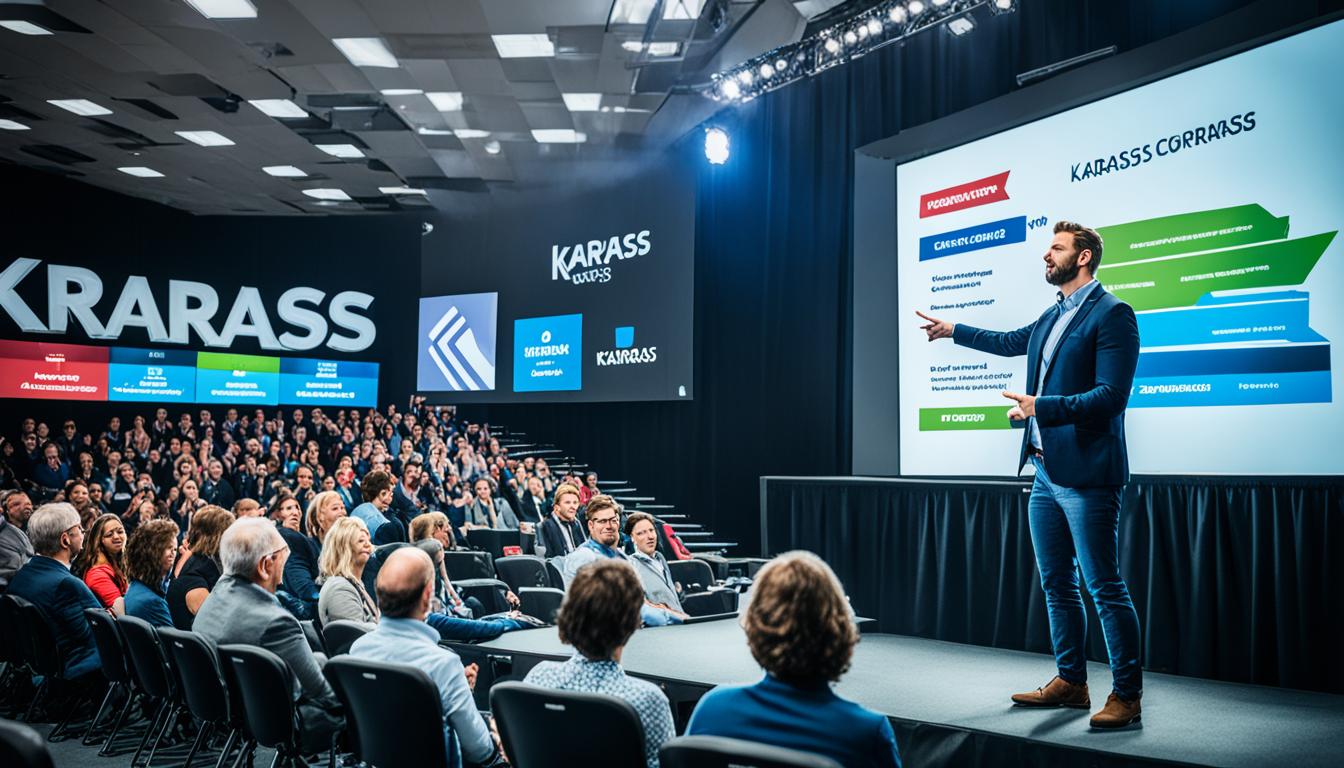Did you know Dr. Chester L. Karrass is a top negotiator and author? He has trained over 1,000,000 professionals in his Effective Negotiating® seminar. With 45 years of experience and strong academic background, he’s a leading figure in negotiation. His seminar has helped people in many fields, like sales and international business.
Dr. Karrass’s seminar teaches key strategies, tactics, and psychological insights for negotiation. It helps people get better deals. His popular books, “The Negotiating Game” and “Give and Take,” have changed how we negotiate.
Key Takeaways:
- Dr. Chester L. Karrass has trained over 1,000,000 professionals in his Effective Negotiating® seminar.
- The seminar helps individuals master negotiation skills and achieve better deals.
- Dr. Karrass’s books, such as “The Negotiating Game” and “Give and Take,” are best sellers in the field.
The Importance of Understanding Common Negotiation Principles
Negotiation is key in many parts of life. It helps us communicate better, solve conflicts, and build good relationships. Knowing how to negotiate well can lead to success and trust.
Being able to talk and listen well is crucial. Effective communication means sharing your ideas clearly and understanding the other person. This way, everyone knows what’s needed and can find a compromise that works.
Conflict resolution matters a lot in negotiation. Disagreements happen, but finding common ground helps everyone. It leads to creative solutions and ends fights in a good way.
“Negotiation is not about winning or losing; it’s about finding a solution that meets the needs of both parties.” – Dr. Chester L. Karrass
Trust is everything in negotiations. When trust is there, people share more openly and work well together. This makes both sides happy with the outcome.
Using these principles can really improve your negotiation skills. They help you communicate better, find wins for everyone, and create strong bonds. Good negotiation skills start with understanding these key ideas.
Knowing how to negotiate helps in many ways. It makes communication clearer, solves conflicts in a healthy manner, and builds lasting friendships. These principles are like a guide for successful negotiation, making everyone better at talking and finding common ground.
The First Rule of Negotiation: Know Before You Go
The first step for a successful negotiation is thorough preparation. You should know your goals and gather important information. It’s also key to understand the other side’s interests and how you can communicate effectively.
Practicing your communication skills is important, too. Staying flexible lets you make the best decisions. This way, you can succeed during the negotiations.
“Know Before You Go” shows how critical preparation is. Good prep leads to outcomes you want and benefits everyone involved.
To get ready for a negotiation, first figure out your goals. What do you want to achieve? Knowing your goals keeps you focused and helps you decide what matters most.
It’s also vital to do your homework on the topic and the other parties. This info helps you make smart choices and share your views clearly.
Understanding where the other party is coming from is crucial. Seeing things from their perspective can help you find common ground. This approach can lead to solutions that work for both sides.

Creating smart negotiation strategies is important, too. Think ahead about different situations you might face. This prep boosts your confidence and improves your chances of a good outcome.
Benefits of Thorough Negotiation Preparation:
- It boosts your confidence and reduces stress
- Positions you for success and improves outcomes
- Helps you make informed decisions
- Enhances how you communicate your views
- Finds common ground and compromises
- Makes it easier to adjust to surprises
Preparation isn’t about guessing every detail. It’s about knowing your goals and having the right info. You should also understand the other side and have strategies ready. When you’re well-prepared, you’re on the way to success.
| Key Steps for Negotiation Preparation | Benefits |
|---|---|
| Define your goals | Stay focused and prioritize your objectives during negotiation |
| Gather relevant research and information | Make informed decisions and effectively communicate your positions |
| Understand the other party’s interests and motivations | Identify areas of agreement and tailor your approach accordingly |
| Develop effective negotiation strategies | Anticipate challenges and adapt to changing circumstances |
8 Simple Do’s and Don’ts of Negotiation
Negotiating well means knowing the right steps and the best setting for win-win results. Here are eight easy rules to help you through negotiations:
1. Pick the Best Place and Time to Negotiate
Find a neutral place that’s comfortable. Make sure everyone can focus and talk things out constructively. It should also be a time when no one is rushed or distracted.
2. Always Consider Your Next Best Alternative
Know your BATNA before you start talking. It means knowing your back-up plan. This knowledge gives you an edge and helps you make smart choices in the negotiation.
3. Leave Room to Negotiate and Give Concessions Slowly
It’s important to let both sides feel like they’re getting something out of the deal. Don’t rush to give things up. Leave space for back-and-forth talks.
4. Avoid Saying Yes Too Quickly
Don’t jump at the first offer. Take your time to think about what’s on the table. Make sure it meets your needs and goals before you agree.
5. Do Not Make the First Concession on a Major Issue
Try not to be the first to give in on big topics. Waiting helps you keep the upper hand later in the negotiation.
6. Plead to a Higher Authority When Needed
Sometimes, bringing in someone with more power, like a boss, can help your case. They can back up your stance and make your position stronger.
7. Practice Active Listening and Be Skeptical
Really listen to what the other side says. It shows respect and helps you understand their point of view. But, always keep your guard up to protect your interests.
8. Consider the Implications of Concessions as the Deadline Approaches
When time is running out, think carefully about what you’re giving up. Make sure you’re not hurting your own chances of getting what you want.
Stick to these tips to create the best setting for negotiations. This way, you’re more likely to get a win-win outcome.

Contracts and Negotiation
Contracts are key in any deal, and negotiating them is common. To do well in contract talks, avoid typical mistakes and use good strategies. It’s important to know the different negotiator types, check the situation, know the other side, figure out leverage, and know your pros and cons. This way, you’re set up for success.
“Successful negotiation is not about overpowering the other party, but about finding mutually beneficial solutions.” – John Smith
Different negotiators have their own strategies. Some may be forceful and others easy-going. Knowing this helps you adapt your style and share what you want clearly.
Common Negotiation Mistakes to Avoid
In contract talks, avoid these common mistakes:
- Using just one tactic
- Not listening well
- Not doing your homework
- Refusing to budge
- Sharing too much, too soon
- Not trying to understand the other side
Avoiding these will sharpen your negotiating skills and help you get better deals.
Effective Negotiation Strategies
To do well in contract talks, use these strategies:
- Thorough preparation: Research well to understand the situation, alternatives, and where you can give a little.
- Active listening: Listen to the other side’s words and body language to get what they really want.
- Seek win-win solutions: Aim for agreements that benefit everyone.
- Create value: Find ways to make the deal better for the other side to up your chances of success.
- Be adaptable: Stay open to new ideas during talks.
| Common Negotiation Mistakes | Effective Negotiation Strategies |
|---|---|
| Over-reliance on one negotiation tactic | Thorough preparation |
| Failure to listen actively | Active listening |
| Lack of preparedness and research | Seek win-win solutions |
| Being inflexible and unwilling to compromise | Create value |
| Revealing too much information too soon | Be adaptable |
| Failure to understand the other party’s perspective |
Using these strategies and understanding the negotiation process well can boost your confidence. It can also make getting what you want more likely.

What Type of Negotiator Are You?
Knowing your negotiating style is the first step to being a good negotiator. It’s important to know if you’re an accommodator, avoider, or competitor. This helps you see your strengths and weaknesses.
Each style of negotiating has its good and bad sides. If you’re an accommodator, you care a lot about keeping good relationships. You’re good at listening and finding solutions that work for everyone. But, you might find it hard to stand up for what you want.
If you lean towards being an avoider, you usually stay away from conflict. This can keep things calm. But, you might miss out on chances, or leave problems unsolved. This can make negotiations harder later on.
Being a competitor means you aim to reach your goals and get the best results. You’re bold, sure of yourself, and ready to take chances. However, this approach can make it hard to work with others and may hurt relationships.
Knowing your natural way of negotiating lets you get better and work on your weak spots. By joining KARRASS’s seminars and workshops, you can learn more about your style. You can also learn how to negotiate in ways that suit you best.

Understanding how you negotiate is just the start. By improving your skills and changing how you negotiate, you can get better results. You’ll be more successful in your negotiations.
Assessing the Negotiation Situation

Before you start negotiating, it’s key to look at the situation. You need to check out the context, what the other side wants, how to talk to them, the power balance, and what you have to work with. Getting a good grip on these things means you can come up with a plan. This plan will boost your chances of getting what you want.
1. Analyzing the Situation
First, understand the scene of the negotiation. Look at when it’s happening, how urgent it is, and if outside events could affect it. Knowing the big picture helps you prepare for what might come your way. This preparation can turn problems into chances for you.
2. Interests of the Other Party
Knowing what the other side wants is key to good negotiating. Spend time learning about their goals and what’s important to them. This info helps you find common ground and spot possible issues.
3. Communication Methods
Good talks are the base of negotiating well. Find out how the other side likes to communicate and adjust your style to match. Some people like to meet in person, while others prefer emails or letters. Matching your communication style with theirs can lead to better teamwork and results.
4. Power Dynamics
In negotiations, power matters a lot. Understand who has more influence—you or them. This knowledge guides your strategy, helping you decide when to give a little or stand firm on what you want.
5. Available Resources
Think about what you have to offer and how you can use it when negotiating. This includes your money, skills, contacts, and other assets. Knowing what you have lets you use it smartly during talks.
By looking at the situation, knowing what the other side wants, choosing how to talk to them, understanding who has more power, and thinking about what you have to offer, you can make a strong plan. Taking the time to review these key points boosts your chance of a win-win result and successful negotiation.
Mastering the Person
Analyzing who you’re negotiating with is as important as knowing the situation. Understanding how to deal with different people, confrontations, and egos is key to negotiation success.
Knowing the other person’s personality and communication style helps in forming the right strategy. Tailoring your approach can build trust and make negotiations smoother.
“The key to successful negotiation lies not only in understanding the situation but also in understanding the person you’re negotiating with.” – Dr. Chester L. Karrass
Using someone better suited for specific personalities can be smart. This strategy uses individual strengths, boosting chances for a good outcome.
Understanding your counterpart helps you adapt and be more effective. It lets you anticipate and respond well, making your proposals more appealing.

Understanding Different Negotiation Styles
It’s crucial to recognize and adapt to different negotiation styles. Some may want to dominate, while others prefer working together and finding common ground.
By spotting their style, you can tweak yours to match. This alignment can lead to more productive talks and better agreements.
Effective Communication and Building Rapport
Good communication is essential for successful negotiation. Listening, staying open, and showing understanding can establish a positive atmosphere.
Keeping your ego in check and knowing what might cause issues helps avoid conflicts. Aiming for collaboration can bring everyone to agreement.
Applying Psychological Insights
Psychology is big in mastering negotiation. Understanding emotions, biases, and how people see things shapes your strategy and choices.
These insights let you handle difficulties and encourage good conversations. Psychology helps you get the other person, making your approach more suited to them.
| Key Tips for Mastering the Person | Benefits |
|---|---|
| 1. Analyze the other negotiator’s personality and communication style | – Develop tailored negotiation strategies – Improve understanding and empathy |
| 2. Delegate negotiations to a better-suited individual | – Maximize chances of success – Leverage individual strengths |
| 3. Adjust your approach to accommodate different negotiation styles | – Foster collaboration and compromise – Reach mutually beneficial agreements |
| 4. Focus on effective communication and building rapport | – Establish a positive negotiating environment – Prevent unnecessary confrontations |
| 5. Apply psychological insights to better understand behavior and motivations | – Navigate challenges and impasses – Facilitate productive discussions |
Being good at negotiation means understanding psychology, communicating well, and being adaptable. By knowing the person, tailoring your approach, and using strengths wisely, you can greatly improve your negotiation success.
Anticipating Leverage
Leverage is crucial in negotiations. It’s important to know the other side’s stance and the leverage they might hold. By spotting potential leverage points, such as being a major customer or offering good terms before, you can plan better.
To use leverage, think about the power balance. If you’re known for negotiating well or have a good reputation, this can help. Knowing these dynamics lets you adjust your strategy to get better deals.
Using what you know about the other’s needs and goals can also be powerful. Research and gather info to understand their priorities and weaknesses. With this insight, you can make arguments and offers that hit the mark, boosting your position in the deal.
Case Study: Leveraging relationships for successful outcomes
“In a recent negotiation with a long-term client, I used our strong relationship as leverage. I talked about our successful past work. This helped me get better terms and a win-win deal.”
Building on trust and past wins, you can negotiate from a place of strength. Using leverage smartly leads to better deals. It helps you reach your goals while keeping good ties with the other side.
Good negotiation involves looking closely at power, interest, and leverage. Using leverage well sets you up for success and boosts your chances of getting what you want.

Considering Advantages and Disadvantages
Before starting a contract talk, it’s key to look at your plan’s pros and cons. This helps you gain power by fixing any weak spots and showing off the strong points. By understanding the good and bad, you can move through talks smarter and handle pushback well.
It’s vital to know what makes your offer stand out. Recognizing how your deal is special helps you during discussions. By pointing out these strong points, you can make your offer look better and up your chances of winning.
But, it’s just as crucial to see and deal with any downsides in your plan. Think of what the other side might not like and plan ways to overcome these issues. Being ready shows you mean business and want a deal that helps everyone.
“By acknowledging and addressing weaknesses in your proposal, you can counter arguments effectively and strengthen your negotiating position.”
Looking at your proposal’s good and bad sides lets you see things from the other’s viewpoint. Guess what they might worry about. Knowing this lets you argue better and calm their fears.
Also, looking at the market and your rivals can show weak spots in your offer. With good research, you can show how your deal is different and better than others.

| Advantages | Disadvantages |
|---|---|
| High-quality product/service | Limited brand recognition |
| Innovative features | Higher upfront cost |
| Proven track record | Longer implementation timeline |
| Excellent customer support | Less flexibility in customization |
Knowing both the good and bad of your proposal lets you be ready for any issue in talks. Stress your strengths to show the value you add. Also, be ready to solve any weaknesses with smart fixes or deals.
Negotiation is about give and take. Use what you’re good at to get a win-win while creatively solving any problems. This smart way increases your chances for a good outcome.
Conclusion
Negotiation skills are vital for success. Mastering the art of negotiation helps you get better deals. Seminars and workshops, like those offered by Karrass, teach valuable techniques.
Enhancing your negotiation skills can improve your business know-how. With these skills, you can confidently handle complex bargaining situations. This includes getting good contracts, solving conflicts, and forming strong bonds. Negotiation is powerful.
So, start boosting your negotiation skills now. This will prepare you for success in any situation that comes your way. Empower yourself with the knowledge to negotiate effectively and win.
FAQ
What is the Effective Negotiating® seminar?
Who is Dr. Chester L. Karrass?
What are the common negotiation principles?
What is the first rule of negotiation?
What are the essential do’s and don’ts of negotiation?
How can negotiation skills be applied to contracts?
How do you assess your negotiation style?
What factors should be considered when assessing the negotiation situation?
How important is it to analyze the person in a negotiation?
Why is leverage important in negotiation?
How should you consider the advantages and disadvantages in negotiation?
How can you develop effective negotiation skills?
How Can Mastering Karrass Negotiation Skills Help Transform My Career?
Mastering Karrass negotiation skills can significantly transform your career by putting you ahead of the competition. Learning effective negotiation techniques from top executive coaches can help you negotiate better deals, advance your career, and achieve your professional goals. Check out the top executive coaches list to find the right mentor for you.










